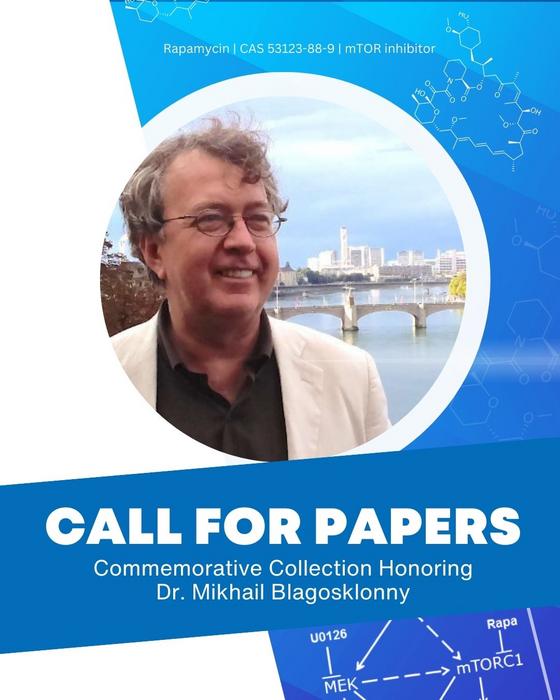Call for Papers: Commemorative Collection Honoring Dr. Mikhail Blagosklonny
In the scientific community, few figures have left as profound an impact on the field of aging biology as Dr. Mikhail Blagosklonny. As we look to commemorate his legacy, it is fitting that we reflect on the groundbreaking contributions he has made throughout his career. Dr. Blagosklonny’s work has significantly shaped our understanding of critical aspects of aging and cancer, particularly through his exploration of the mechanistic target of rapamycin (mTOR) signaling pathway. This significant call for papers invites a collective examination of his theories and discoveries, providing a platform for researchers to contribute to a special collection focused on the core themes of his research.
The journal Aging (Aging-US) is now announcing an important call for papers dedicated to commemorating Dr. Mikhail Blagosklonny’s influential career. This commemorative collection will serve as a tribute to his invaluable contributions, fostering scientific exploration in areas he has significantly impacted. For researchers, this is an exceptional opportunity to honor a legendary figure whose work has revolutionized aging biology and cancer research. The focus will be on detailed explorations of critical themes that Dr. Blagosklonny illuminated, including the regulatory roles of mTOR in various metabolic processes and its implications for aging and age-related diseases.
Dr. Blagosklonny has posited vital insights into the relationship between mTOR signaling, aging, and the potential pharmacological interventions that could extend lifespan. One avenue of exploration within this collection will revolve around the applications of rapamycin, a drug that has emerged as a central player in anti-aging discourse. Researchers are encouraged to delve into the multitude of ways rapamycin and other similar compounds can be utilized in extending healthspan and lifespan. Such investigations could lead to groundbreaking advancements in therapeutic strategies aimed at delaying aging, highlighting the intersection of pharmacology and lifespan health.
Furthermore, the collection will emphasize the concept of senescence bypass—a critical area of study linked to both cancer and regenerative medicine. Understanding how to circumvent cellular senescence is crucial for enhancing tissue regeneration and developing targeted therapies for age-related diseases. Dr. Blagosklonny’s contributions are particularly relevant here, as he has outlined how cellular aging interacts with oncogenesis. This thematic focus will offer a rich angle for researchers to propose novel insights and empirical studies, potentially inspiring future therapies that could enhance regenerative capacities.
Personalized medicine represents an evolution in how we approach treatment and care, especially concerning aging and longevity. This special issue will explore the integration of personalized approaches into aging research, building upon Dr. Blagosklonny’s pioneering ideas. Personalized strategies allow for the tailoring of therapeutics to individual biological profiles and genetic backgrounds, which can lead to enhanced efficacy and reduced risk of adverse effects. The call invites submissions that investigate the practical implications and methodologies for incorporating personalized medicine into aging research, thereby aiming to improve outcomes for patients.
Theoretical perspectives on aging, including various evolutionary models, will also be a key focus of the commemorative collection. These discussions can shed light on the biological motives behind aging and its implications for modern health science. The application of evolutionary theory to the understanding of aging has opened new corridors for research, prompting a reevaluation of long-standing assumptions. Contributors are invited to propose innovative theoretical frameworks that relate evolutionary insights to contemporary aging biology, thereby enriching the dialogue surrounding the fundamental nature of aging itself.
The guest editor for this collection, Dr. David Gems, is renowned for his expertise in aging research. His leadership will ensure that the selected contributions reflect the high-quality standards that honor Dr. Blagosklonny’s legacy. Under Dr. Gems’ supervision, the collection aims to rightfully celebrate Dr. Blagosklonny’s profound influence on the field while simultaneously propelling the discourse forward, inviting fresh perspectives and new hypotheses.
As researchers within this field, the invitation to submit original research, reviews, and perspectives to this commemorative issue represents a unique occasion to contribute to a lasting tribute. The accepted papers will contribute to an evolving narrative that seeks to honor Dr. Mikhail Blagosklonny while also pushing the boundaries of our understanding of aging biology and age-related diseases. Through this space, we can collectively engage with his lasting legacy and celebrate the scientific community’s continuous evolution in these critical realms of research.
The submission details are crucial for interested researchers. The deadline for submissions is set for December 1, 2025. Manuscripts must adhere to the journal’s submission guidelines to be considered for review. This process will include a rigorous peer-review phase to maintain the quality and integrity of the work being published. Generated contributions will not only honor Dr. Blagosklonny but aim to uplift the entire field of aging research, stimulating further inquiries and innovations.
In closing, this special issue will serve as a powerful homage to the scientific legacy of Dr. Mikhail Blagosklonny. Through collaborative efforts, we aim to forge a collective understanding that reaffirms the importance of his work and reenergizes the exploration of topics central to aging biology. We look forward to welcoming your contributions, as we collectively recognize and propagate the enduring significance of Dr. Blagosklonny’s contributions to science.
Subject of Research: Aging Biology and Cancer
Article Title: Call for Papers: Commemorative Collection Honoring Dr. Mikhail Blagosklonny
News Publication Date: April 3, 2025
Web References: Aging (Aging-US)
References: Not available
Image Credits: Credit: Impact Journals, LLC
Keywords: Gerontology, mTOR, Aging Research, Cancer, Rapamycin, Personalized Medicine, Cellular Senescence, Evolutionary Perspectives, Therapeutics, Healthspan, Scientific Publishing, Peer Review.




